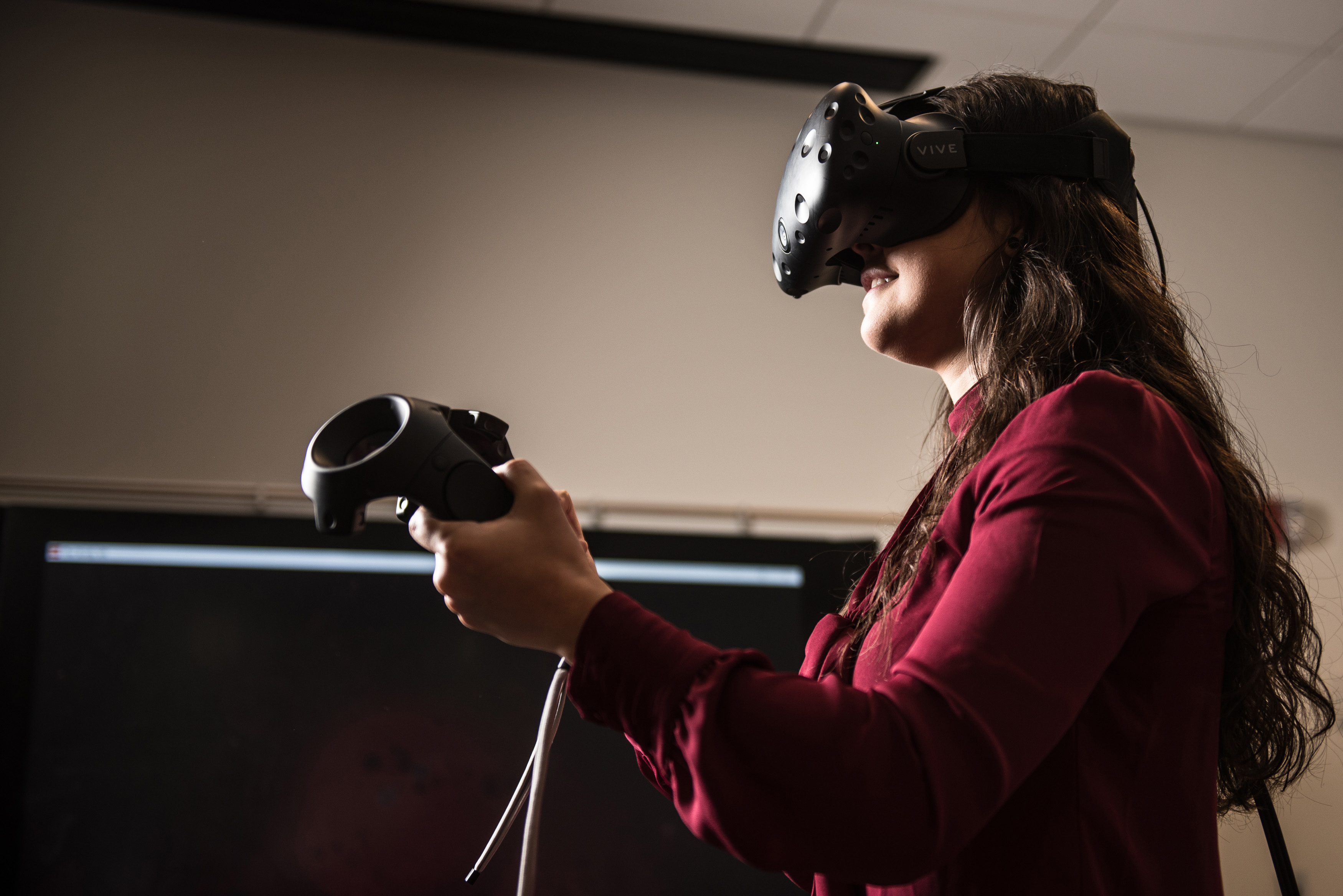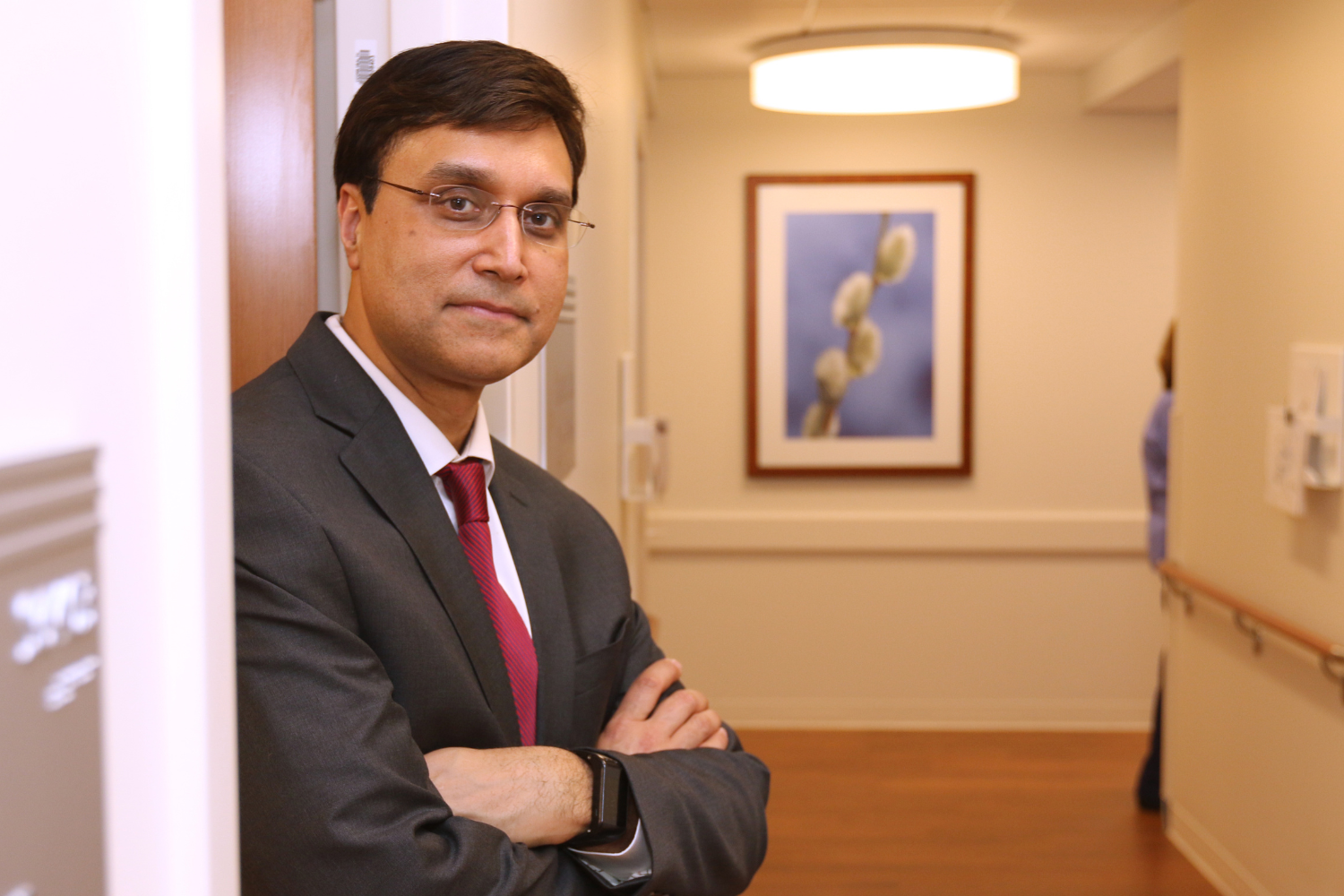With a virtual reality headset on, junior Carina Zamudio ’19 (CLAS) spent part of a recent Friday afternoon at the OPIM Innovate Lab trying to slay villains who were intent on breaching the security around a virtual castle.
Zamudio, a communication major, was surrounded by faculty and students giving her advice and cheering her success, as the challenge flashed on a large screen.
The HTC Vive, the equipment she was using for the virtual reality experience, is one of three tiers of virtual reality that the lab has to offer. Although they build interest in students with game-like experiences, the technology is helping to show how disruptive virtual reality is becoming to the many sectors of business.
While Zamudio took advantage of her first exposure to virtual reality, Tyler Lauretti ’18 (BUS), a senior management information systems (MIS) major, was using the Internet of Things to precisely calculate how much light, water, and fertilizer a plant growing in the lab needs in order to thrive. With a voice command to Amazon Alexa or a touch of a button on an iPad, he can turn on a fan that will cool the plant or make other environmental calculations.
When you look around, technology is everywhere – from Google Home and Alexa to smartphones and wearable devices. We want people to realize it isn’t really scary stuff. — Jonathan Moore
Gathering data and using it to make efficient and effective business decisions intrigues Lauretti. He’s hoping to share his technology skills to help students at UConn’s Spring Valley Farm gain more precise agricultural information.
“You have to keep up with technology,” Lauretti says. “The goal of my project is to eliminate the need for human interaction and have devices get things done.”
One of the Coolest Places on Campus
OPIM Innovate, located in the Gladstein Research Laboratory on the third floor of the School of Business, is a place where emerging technology is embraced. There, even the least technologically savvy student, faculty, or staff member can experiment with technology and acquire new skills. It is one of several initiatives the University has made in promoting emerging technology and innovation, an advancement that gives UConn students an advantage when entering the digital job market, says Jonathan Moore, coordinator of OPIM Innovate and director of the MIS program.
The OPIM Innovate initiative has rapidly expanded to welcome all students, regardless of major, for experiences with virtual reality, 3-D printing, the Internet of Things, microcontrollers, and data analytics. A broad array of topics are covered in the workshops hosted every other Friday in the Gladstein Research Lab. Future technologies are starting to be researched, including drones, artificial intelligence, and blockchain.
“Our original goal was to attract students to our management information systems (MIS) major,” Moore says. “Many students come to the School of Business undecided about their specific path and a little bit afraid of technology. We wanted to give them something fun to get over that fear, and this has worked extremely well.
“I’m a big believer in experiential learning and adding skill sets to your resume,” he continues. “We want students and faculty to learn and explore. We have a creative environment that’s open, flexible, and hands-on.”
Ram Gopal, professor of OPIM and department head, describes it as a “stratospheric” program.
“We’ve gotten so much kudos from the students,” he says.
The OPIM Innovate initiative was triggered by student interest and a conversation Moore had with a utility company executive who wanted students to create natural gas tank sensors that would alert the company when a customer needed a refill.
“I could immediately see that we needed to provide these skills and advantages for our students,” Moore says. “I think we are ahead of most other universities in this area.”
Lauretti, now the student lab manager, wanted to enhance his skills after completing a summer internship in Travelers IT division in 2016. He recognized the insurance giant’s commitment to emerging technology.
Now, he has not only learned these skills, but also how to teach them. “If the workplace wants it, we want to prepare for it,” Lauretti says. “Plus, the Lab is one of the most fun places on campus!”
In fact, the Lab is so special that private high schools, the Connecticut Transportation Institute, and other external partners have visited to learn more about emerging technology and how to teach it.
Emerging Technology Caters to Every Interest
One of the program’s goals is that students appreciate the application of emerging technology to multiple fields.
Evan Gentile ’18 (ENG, BUS), a senior management and engineering for manufacturing (MEM) major, has learned 3-D printing skills at the Lab, and even printed a model of the School of Business that took 118 hours to complete.
“I was very wary of artificial intelligence initially,” he says. “Now I think it can become a great tool for both business and engineering.”
Gentile is now creating facial-recognition software that may eventually be used as an identity-protection measure.
“At every level, we want to tease and build interest,” says Moore, adding that the student lab specialists make the center more welcoming to their peers. “We start out with more simple things, like games, and you can always come back and learn more. We provide the process, the space, and the resources for people to experiment with technology.”
Inspiration is virtually everywhere in the lab.
Students Jenny Tang, an individualized major, and Micheca Fevrius, an MIS major, are developing a sophisticated app for the City of Hartford that would allow community members to learn more about their city and the services that are available, but in a fun way. They’ve built the project in the OPIM Innovate area, with Moore as their adviser. For Tang, who hails from Hartford, the opportunity to do something helpful for the city where she grew up is especially appealing.
Randall Borruso, now a graduate student at UConn, used the lab last year to work on a team engineering senior design project, an electronic travel aid that was both affordable and intuitive for people with visual impairment. The device uses ultrasonic sound pulses to detect objects in a room and relay the information via a wearable vibration pad for the user, signaling them before bumping into furniture.
“My job was to create the housing for this device, and the 3-D printers in the OPIM Lab were the key to creating prototypes and models for the housing,” he says. “Without the lab, I would not have been able to make such an accurate fit to our design, because it took a lot of trial and error before I was finally able to create the finished product.”
Optimism About What the Future Will Bring
“When you look around, technology is everywhere – from Google Home and Alexa to smartphones and wearable devices. We want people to realize it isn’t really scary stuff,” says Moore. “It is complex, but it fits well with the School of Business curriculum and also bridges gaps across many disciplines.
“We are just approaching the tip of the technology iceberg. And I believe the field that will be most strongly impacted is business,” he adds. “Some people fear that new technology will have a negative impact on our society, but when you look at what our students are accomplishing, most of their work is making the world easier, safer, and better for others. It just gives you a tremendous sense of optimism about what the future will bring.”



